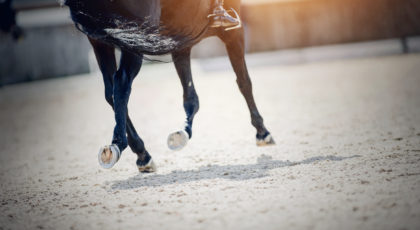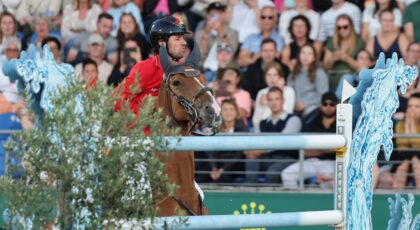Like any top level equestrian event, the Palm Beach Masters is a bustling ecosystem of equine professionals and practitioners moving in methodical bursts from one job to the next. The riders have their support teams of trainers, coaches, owners, friends and family, while equine athletes draw the services of grooms, veterinarians and farriers.
This is how the ecosystem has always functioned in the equestrian world. Although theoretical teammates, the horses and their human pilots are often viewed individually and almost always serviced as such, and that’s what makes Sharon Classen’s work so unique.
Classen has been making waves at the top levels of equestrian sport over the past few years by applying the fundamentals of sports medicine in treating both riders and horses. It’s an approach she believes is much needed and long overdue in the equine world.
“I treat both humans individually and the horses, and then also evaluate the biomechanical interplay between horse and rider,” Classen explains. “For example, if we have a rider that has a low back injury, and the horse is jumping over the fence, the rider might have a tendency to shift to the right to compensate for any pain that they might have. The horse will then upon take-off perhaps swing to the left over the fence, and if that’s the case that’s not the correct form. So when I work on the rider and get them so they’re biomechanically correct, then I have seen that the horse then jumps with correct form over the fence.”
Classen arrived here via the intersection of work and hobby. Armed with a degree in Physical Therapy from the University of Nebraska, she spent years working with elite human athletes at the Olympic Training Center and the Nebraska football team, while finding time to compete at various hunter/jumper shows when time allowed. Now, she is busily building the bridge between horse and human medicine under the name Serenity Physical Therapy. While based out of the family farm just outside Omaha, she travels the globe to service the top riders and horses in equestrian sport, applying the core principles of human sports medicine into the equine world.
“The movement in veterinary medicine is they’re very interested in sports medicine,” Classen said. “For a vet and a physical therapist to work together, along with all the other ancillary services that are needed for these animals to improve their longevity, can only benefit the horses.”


 February 27, 2018
February 27, 2018 

























